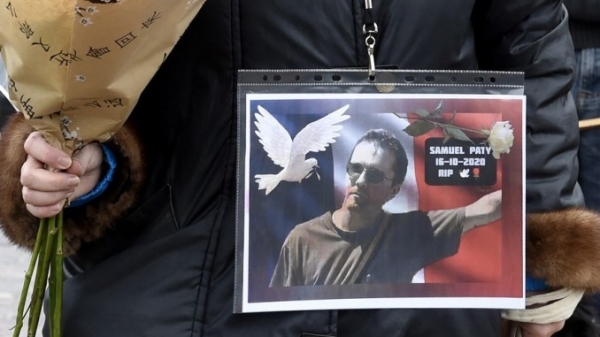
The murder of the French middle-school teacher Samuel Paty on Oct. 16 shook the world. Paty presented a cartoon of Muhammad from the satirical magazineвҖҜCharlie Hebdo in his classвҖҜto teach freedom of expression. Although he advised his Muslim students to leave the classroom if they deemed his teaching inappropriate, Paty’s lecture offended some Muslims, leading one of the parents to file a complaint. The parent also claimed on multiple social media platforms that Paty showed an image of a naked Muhammad to his students and exposed the teacher’s name and the school address. An 18-year-old Muslim refugee, Abdoullakh Abouyedovich Anzorov, who encountered the dispute, tracked down Paty and beheaded him. Anzorov posted a photo of the victim on his Twitter account, saying that he “executed one of the hellhounds who dared to belittle Muhammad.” The perpetrator was shot down after he resisted the police.
Many people were horrified by the murder of Paty. Thousands gathered in Paris’s Place de la République to express solidarity with Paty and to assert freedom of speech. President Emmanuel Macron of France commemorated Paty’s death and praised Paty, stating he was “killed because he was teaching freedom of speech.” Furthermore, Macron’s government took a firm stance against radical Islamism, condemning it as an “enemy of freedom”. Muslim organizations are also criticizing the terror attack. The Muslim World League disputed the murderer, claiming that “the acts of violence and terrorism are crimes in all religions.”
Nevertheless, Muslim society is deeply upset with France’s response regarding the caricature and free speech. Many Islamic nations condemn the murder of the Paty but argue the freedom of speech should be limited to a certain extent and that hatred against Islam under the guise of freedom of expression should be halted. Some Muslim countries even called for a boycott of French products.
Amid growing tensions, France is increasing security at religious sites and has closed a mosque suspected as a site of radical Islamist tendencies.
Meanwhile, the attack has re-ignited a continuing controversy regarding a fundamental French republican value: laïcité. Laïcité is translated to “French Secularism”, which is the separation of the Church and the State. The French government defines the republican principle as “the freedom of conscience, the freedom to believe or not to believe.” Based on laïcité, the government “implies the freedom to practice a religion, in private or in public” but sets limits to “the freedom to manifest one’s convictions” so that the practice does not disturb public order.
There has been ongoing criticism that laïcité causes division in French society and consequently instigates radicalization. Some claim that laïcité, though controversial, tends to discriminate against Muslims. State holidays are on Catholic holy days, and constant legislation banning Islamic clothing unsettles Muslims. The 2004 legislation, which prohibits the wearing of visible religious signs in school, raised controversy worldwide. Because the bill was proposed after the dispute where 24 schoolgirls were expelled for wearing a hijab, many viewed that the regulation was targeted towards Muslims. Due to such regulations, many Muslims feel opposed by laïcité. Boualem Sansal, author of 2084: The End of the World, claims that Muslims view laïcité as “an injunction to abandon their religion.”
However, Macron claims that “the problem isn’t laïcité.” He states that “laïcité means the neutrality of the State; in no way does it mean the removal of religion from society and the public arena.” The French government believes that laïcité is in need more than ever as society is culturally more diverse. French Ministry for Europe and Foreign Affairs states “secularism is needed, for it enables all citizens, whatever their beliefs, to live together, enjoying freedom, equal rights, and republican fraternity.”вҖҜ The French government plans to present a bill aiming to strengthen laïcité and consolidate republican principles.
The French government has long tried to apply laïcité on Muslims. The government claims that laïcité is non-negotiable, and legislations are to be made for its continuation. However, some argue that laïcité exacerbates the division between Muslims and the French mainstream society, leading to the instigation of extremism. They claim that the sense of denial from the society inflicted by laïcité isolates Muslims and that such division, in turn, leads to radicalization, including terrorism.
Terrorism cannot be justified. No claim can vindicate such attacks. However, considering the ongoing controversy, the French society should review the current situation regarding laïcité. If the French government diversifies its laïcité-based policies to embrace Muslims, perhaps France will be able to abridge its division and move forward.


